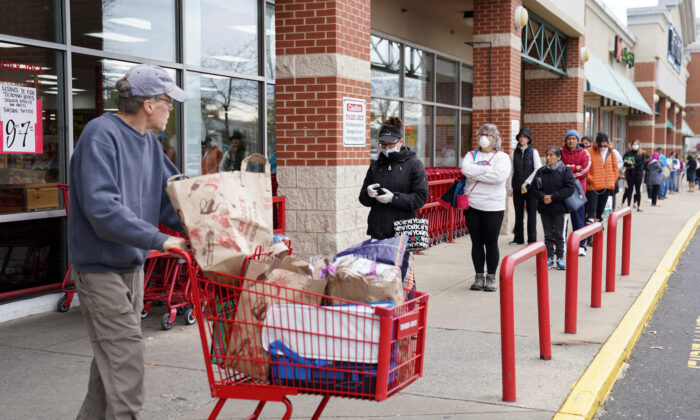Elderly French Woman Finds 13th-Century Painting in Her Kitchen Worth Over $26 Million
U.S. consumer confidence dropped to a near three-year low in March as households worried about the economy’s near-term outlook amid the COVID-19 pandemic.
The survey from the Conference Board on Tuesday came in the wake of reports last week showing the number of Americans filing for unemployment benefits surging to a record 3.28 million in the week ending March 21, and business activity hitting an all-time low in March.
The country has ground to a sudden stop as authorities enforce strict measures to control the spread of COVID-19, a respiratory illness caused by the Chinese Communist Party (CCP) virus.
The Consumer Confidence Index fell sharply in March to 120, down from 132.6 in February.
“The intensification of COVID-19 and extreme volatility in the financial markets have increased uncertainty about the outlook for the economy and jobs,” said Lynn Franco, Senior Director of Economic Indicators at The Conference Board, in a statement accompanying the report.
“The Present Situation Index remained relatively strong, reflective of an economy that was on solid footing, and prior to the recent surge in unemployment claims,” she wrote.
The United States has registered over 174,000 COVID-19 infections, with over 3,400 deaths attributed to the disease, according to a Johns Hopkins tally.

“March’s decline in confidence is more in line with a severe contraction—rather than a temporary shock—and further declines are sure to follow,” Franco said in the note.
The Expectations Index, which is based on consumers’ short-term outlook for income, business, and labor market conditions, fell from 108.1 in February to 88.2 in March.
“Even in early March, consumers were getting very concerned about the outlook and obviously that will only have strengthened over the last few weeks,” said Bart Van Ark, chief economist at the Conference Board, in an interview on Bloomberg Radio.
Van Ark said the figures show the beginnings of a collapse in confidence.
“This doesn’t point at a temporary shock but more like a severe contraction,” Van Ark said in a tweet. “Supply shock will soon give way to demand slump,” he predicted.
Kathy Bostjancic, chief U.S. financial economist at Oxford Economics, said the March decline, while steep, still understates the damage to confidence because a dramatic surge in layoffs didn’t begin until after the survey had been completed in mid-March.
“A much steeper plunge is in store for April,” she said, noting that a recent Washington-Post/ABC News poll revealed that one-third of Americans report that either they or an immediate family member has lost their job. And more than 60 percent in the survey said they think this recession will be as bad as or worse than the 2007-2009 Great Recession.

McKinsey & Co., a management consultancy, said in a March 30 briefing note on COVID-19, that “the next normal will look unlike any in the years preceding the coronavirus, the pandemic that changed everything.”
“Every assumption underpinning a business is open to question,” the authors of the brief wrote (pdf). “The pendulum might not swing back fully once the outbreak has relented. Having experienced a new way of living, consumers are recalibrating their spending, increasing the likelihood that spending may permanently shift between categories and that online services could get adopted far faster.”
The Federal Reserve has taken extraordinary measures to offset the economic damage from the pandemic, and President Donald Trump last Friday signed a $2.2 trillion stimulus package to cushion the economy, which economists believe is already in recession.
This article is from the Internet:US Consumer Confidence Slumps to Near 3-Year Low
NGO Urges Adoption of New ‘Pandemic Paradigm’ for COVID-19 Vaccine Development
